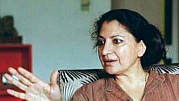Mounting international interest in 'Tomb of Sand' owes much to Daisy Rockwell's translation
The English translation of ‘Ret Samadhi’, first published in 2018, has generated considerable interest in Hindi novels though translations of several earlier works were already available

This year’s International Booker Prize, awarded to Tomb of Sand, a work written in Hindi, translated into English and published in UK, has been jointly shared by the Delhi-based author Geetanjali Shree and the US based translator Daisy Rockwell.
It has created a buzz in literary circles; not only because this is the first Hindi or even the first South Asian novel to get the award, but also because the Hindi original, ‘Ret Samadhi’ was published in 2018 and though it was hailed then as a major work of fiction, it did not receive the kind of publicity that the Booker has ensured, nor when it was translated into French.
Veteran critic Virendra Yadav points out that English translations of such Hindi literary works as ‘Godaan’, ‘Jhootha Sach’, ‘Aadha Gaon’, ‘Tamas’, ‘Raga Darbari’ and ‘Kalikatha via Bypass’ were made available to the English readers even earlier but they did not generate the kind of excitement that ‘Tomb of Sand’ has. Did they deserve similar recognition is the unarticulated question even as Yadav apprehends that the Booker would induce writers in Hindi to tailor their work to suit requirements of British publishers. He feels it is unfair of the Booker award committee to restrict eligibility to only English translations published in UK.
More charitable critics believe that both the quality of translation and communication technology which enabled the author and the translator to have far more intense and regular interactions may have played a role in ‘Tomb of Sand’ taking English readers by surprise. Indeed, Daisy Rockwell has translated other Hindi works in the past but she might not have had the opportunity earlier to discuss extensively with authors the various nuances while translating their work.

There has been some surprise at the award not receiving even a congratulatory tweet from the Indian Prime Minister, who is known to have promoted films like Kashmir Files and who is fond of personally applauding every Indian success story.
The muted response from the establishment might have something to do with the fact that Geetanjali Shree studied and taught in the much maligned JNU, derided as a communist bastion by the BJP and the RSS; or they might have been put off by the book dwelling on the disintegration of an upper middle class and upper caste family and seamlessly linking it with the Partition and disintegration of a nation. Perhaps the novel’s core theme of the futility of borders left the establishment cold.
As another critic Ashutosh Kumar quips, ‘Tomb of Sand’ may appear to be an apolitical novel about relationships, a family and the women in it but at its core it is an intensely political novel that dispassionately exposes the role of power and the state in relationships.
Poet, essayist and critic Ashok Vajpeyi, reacting to criticism that the novel demands patience and effort on the part of readers, quips that if readers find the mature construction of the novel and its word-play difficult, then the problem is with readers and not the novel. He playfully refers to the Hindi proverb that an empty vessel makes much sound; and then goes on to quote Agyeya who was fond of reminding people of an Arabic proverb which held that if a human mind hits a vessel and a sound emanates, there is no reason to believe that it is the vessel which is empty!

Asked what made her write ‘Ret Samadhi’, this is what Geetanjali Shree explained in one of the interviews, “The image of an old, bed-ridden woman’s back, who seemed to care to live no more and pushed deeper into the wall, as if to bury herself in it, gradually took hold of me. It aroused my curiosity: is she indeed tired of life and the world and so turning her back to them, or slowly readying herself for a new and different innings in life? When she seems to want to disappear in the wall, is she wanting the end or actually wishing to burrow through and come out on the other side?”
What is striking about the unusual style in which the novel has been written are the multiple voices in which everyone and everything tells the story. When asked, therefore, to single out one fun fact about the novel, she had this to say: The way anything and anyone narrates some part of the tale—birds, butterflies, even doors and walls and the road, and also a character who apologises for joining in the narration since he does not belong to the story, but is doing it since he happens to be there on the spot by chance.
How does the translation by Rockwell fare in comparison to the Hindi original? Writing in Money Control Danish Khan provides some idea. “…there were quite a few occasions when I found myself reaching for the Hindi text to savour it. One such occasion was when the culinary difference between Eastern and Western Uttar Pradesh is spelt out by contrasting Bade’s (Ma’s son who is a civil servant from Eastern UP) preference for bharhara, makuni, guramma, tikkar while his wife, Bahu, who’s from Western UP, would cook jhordoi, phajita, mathaghuinya. That’s where the urge came to check the Hindi prose and Rockwell’s translation came across as satisfying as tasting these dishes.”
(This was first published in National Herald on Sunday)
Follow us on: Facebook, Twitter, Google News, Instagram
Join our official telegram channel (@nationalherald) and stay updated with the latest headlines